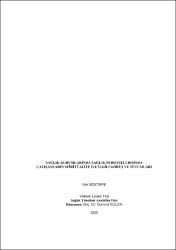| dc.description.abstract | Çalışma, sağlık kurumlarında sağlık personeli dışında çalışanların spiritüalite ile ilgili tutumlarını, görüşlerini ve bunları etkileyen faktörleri belirlemek amacıyla Tekirdağ Namık Kemal Üniversitesi Sağlık Uygulama ve Araştırma Merkezi’nde 110 çalışanla gerçekleştirildi. Tanımlayıcı ve kesitsel nitelikte olan araştırmanın verileri, literatür taraması sonrasında araştırmacılar tarafından oluşturulan anket formu kullanılarak elde edildi. Elde edilen verilerin analizin için frekans, yüzde, ortalama ve standart sapma analizleri, Chi-Square Test, Shapiro-Wilk Testi, Independent Samples T Test, Mann-Whitney U Test, One-Way ANOVA ve Kruskal-Wallis Testi kullanıldı. Araştırmaya katılan çalışanların yaş ortalaması 31,74±7,27, %71,8’i kadın, %28,2’si erkek, %13,6’sı ilköğretim ve altı, %40,9’u lise, %45,5’i lisans ve üzeri eğitim düzeyine sahip idi. Çalışanların gelir durumlarına göre ise %59,1’nin iyi, %40,9’nun düşük gelir düzeyine sahip olduğu, %52,7’sinin evli, %47,3’nün bekâr, ortalama 1,51±0,5 çocuğa sahip oldukları, çoğunun (%63,6) kendi memleketlerinde veri giriş personeli (%67,3) olarak görev yaptığı saptandı. Çalışanların %40,9’u spiritüaliteyi güçlüklerle baş etmede kullandığı ve spritüalitenin yaşadıkları stresi azalttığı, %35,5’i moralini düzeltmek için spritüaliteye başvurduğu, %36,4’ü spritüalitenin kendisini yaşama bağladığı, %33,6’sı diğer kişilerle olan iletişimini etkilediği, %31,8’i hastane ortamında spiritüel gereksinimlerini karşılamak istediği, sadece %19,1’nin spiritüel gereksinimlerinin herkes tarafından bilinmesinin kendisini tamamen rahatsız ettiği saptandı. Çalışanların %35,4’ü hastaların spritual bakım gereksinimlerinin karşılanmasında hastanede görev yapan sağlık çalışanları ile birlikte sağlık çalışanı olmayan tüm sağlık kurumu personelinin de görev yapması gerektiğini, %78,2’si hastanede verilen spiritüel bakımın yetersiz olduğunu düşündüğü, sadece %11,8’i spiritüel bakıma destek verme isteğinde bulunmadığı belirlendi. Çalışanların %91,8’i hastaların spiritüel hastane ortamında karşılanması gerektiğini, %31,8’i hastanede hastaların spiritüel gereksinimlerinin karşılanması için kesinlikle danışılabilecek bir uzman olması gerektiğini, %35,5’nin hastaların spiritüel desteği isteme ya da reddetme hakkına sahip olduğunu düşünmekte idi. Sonuç olarak, araştırmamızda çalışanların spiritüel desteği yeterli bulma durumu ile eğitim düzeyleri, spiritüel desteğin hastaların psiko-sosyal iyileşmesine katkısı olduğunu düşüncesi ile hastanedeki görevleri, spiriüalitenin hastalıklarla baş etmede ve hastalara moral vermede etkili olduğu düşüncesi ile medeni durumları, spiritüalitenin sağlığı olumsuz etkileyecek davranışları hastalarda engellediğini düşüncesi ile çocuk sahibi olmaları ve yaşları, spiritüalitenin hastalarda iletişimi etkilediği düşüncesi ve çalışma hayatlarında hastaların spiritüel gereksinimlerini daha fazla göz önünde bulundurması ile memleketlerinde görev yapma durumları arasında anlamlı ilişki saptandı (p?0,005). | en_US |
| dc.description.abstract | The aim of the study carried out with 110 employees at Tekirdag Namık Kemal University Health Research and Application Center was to determine the attitudes and the opinions of the employees other than healthcare personnel in healthcare institutes towards the spirituality and the factors affecting them. The data of the study being descriptive and cross-sectional were obtained by using a questionnaire form prepared by the researchers after the literature review. Frequency, percentage, average and standard deviation analyses of the obtained data were performed using Chi-Square Test, Shapiro-Wilk Test, Independent Samples T Test, Mann-Whitney U Test, One-Way ANOVA and Kruskal-Wallis Test. The age average of the employees participating in the study was 31,74 ± 7,27, 71. 8% of them was female and 28,2% were male. Concerning education level, 13.6% of them had primary education and lower educational background, 40.9% of them had high school education, 45.5% of them had undergraduate education and higher education. Regarding the income status of the employees, 59.1% of them had a good level of income, 40.9% had a low level of income. In addition, 52.7% of them were married, 47.3% of them were single. They had an average of 1.51 ± 0.5 children and it was found that most of them (63.6%) were data entry personnel in their hometowns (67.3%). It was found that 40,9% of the employees use spirituality to cope with difficulties and that spirituality reduced stress. 35.5% applied spirituality to make themselves happy and 36.4% believed that it held herself/himself on to the life and 33.6% stated that it affected his/her communication, 31.8% was willing to meet the spiritual needs in the hospital environment whereas only 19.1% was completely disturbed by the recognition of the spiritual requirements by everyone. 35.4% of employees believed that employees other than healthcare personnel had to work with healthcare personnel in order to meet the spiritual care requirements of the patients. 78.2% of them stated that spiritual care was insufficient and only 11.8% of them did not want to provide spiritual care. 91.8% of the employees stated that patients had to be met in the spiritual hospital environment whereas 31.8% noted that there had to be an expert in order to meet the spiritual needs of the patients in the hospital. 35.5 % of them felt that patients had the right to request or reject the spiritual support. As a result of the study, a significant was found between employees’ education level and finding the spiritual support adequate, the idea that spiritual support contributes to the psycho-social recovery of patients and their duties in the hospital, marital status and the thought that spirituality is effective in coping with diseases and giving moral support to the patients, the thought that spirituality prevents the behaviors that will adversely affect health and having children and their ages, the idea that spirituality affects communication in patients and patients to consider more the spiritual needs of patients in their occupational lives and working in their hometown (p?0,005). | en_US |



















